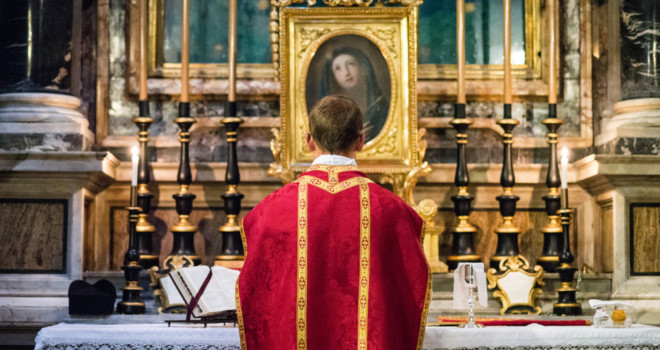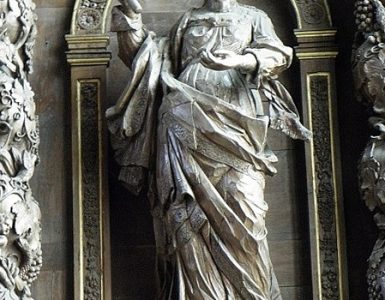He must increase, while I must decrease
I was 46 years old when I was ordained a Deacon of the Archdiocese of Toronto, and so at this point in my life, I was a layman for much longer than I’ve been a Deacon. In fact, that will probably not change—I don’t expect to live till I’m 93. For some things, that can be a significant advantage over those who have been priests longer than they were laymen; for I remember very clearly what it was like being a married layman, going to Mass week in and week out, so often wondering why this rich intellectual and spiritual heritage that is ours in the Church, so relevant and practical, is just not being shared with these people whom I see around me at Mass, many of whom were struggling to keep their children quiet after making it through the cold and the snow to get there in the first place.
I knew then that this heritage of ours is rich and life changing because I was introduced to it by a very ordinary and unpretentious priest who was generous enough to stop his rented car to give me a lift part of the way to Nashville, Tennessee, the day I was hitchhiking on highway 71 just outside of Columbus, Ohio, 17 years old and lacking a prefrontal cortex, oblivious to the dangers of hitchhiking through the U.S with only $150 in travelers cheques. In that two-and-a-half-hour drive with this young priest from the Archdiocese of Washington D.C., I experienced what a fervent love for that Catholic heritage can do for a person and how much happier I could be if I were to embrace it once again.
I know what lay people need, because I remember what I needed and what I received, and I have not forgotten what friends and acquaintances have said to me in frustration many times over the years regarding what they need, but were not getting—I understood them only because I was given that two and a half hour window on a drive in a foreign country, a window to the faith of my childhood, and that was enough for me to decide, then and there, to return to the faith of the Church.
Kevin Wells knows what it means to be a great priest, because he grew up in the shadow of this ordinary and unpretentious priest who stopped to give me a lift that hot spring day in 1979. His uncle, Monsignor Thomas Wells of the Archdiocese of Washington D.C., saw himself as nothing more than an ordinary priest, and extraordinary things were accomplished through him precisely because he did not see himself as anything other than ordinary. The Lord was able to do great things through him precisely because he was genuinely “decreased” in his own eyes (Jn 3:30).

This book was not written by a priest about the priesthood, nor was it written by an overly zealous ‘know it all’ whose ruling passion is exposing episcopal errors. Rather, Kevin Wells is someone whose heart, mind, and soul, were shaped by the profound influence that his uncle’s love for the priesthood had on him.
The Priests We Need to Save the Church is filled with profoundly moving examples of ordinary priests who do extraordinary things by virtue of a genuine love for the priesthood and all it implies; like his uncle, they are ordinary and unpretentious, and so they are priests that any priest can become; for they have stuck close to the basics: love of the Catholic faith, love for the Blessed Mother, love for prayer and fidelity to the breviary, much time before the Blessed Sacrament, which spawns a love for people, which in turn makes them available, and provides the courage to preach meaningfully and sometimes even the difficult truths of the gospel, but with great tactfulness. Interestingly enough, these priests all operate within a spirit that is always on the lookout for those graced moments that God creates for his priests to seize and be the alter Christus that they have become by virtue of their ordination.
Bishop Mario Dorsonville, Auxiliary bishop of Washington D.C., says of Kevin’s uncle: “Tommy was one who helped show me what a priest does. This is who a priest is. Tommy was a priest always filled with great joy because he spent his entire priesthood serving others. People loved him because he served them” (p. 170). And I remember well the day I learned that Father Tom was murdered, and I will never forget the two vigil Masses held at Sacred Heart the night before his funeral.
As Kevin elaborates: “Fire codes were broken at my uncle’s funeral. Roads were shut down and traffic redirected. Some news reports estimated that more than three thousand mourners had poured into Sacred Heart Church, where Tommy began his ministry. It wasn’t just the laity who loved him; priests from three or four dioceses attended his funeral. It took ten minutes for the 250 priests, deacons, and seminarians to process in at the beginning of the Mass. This included seven young men whom Tommy had recently led to the seminary. …It has become clear to me what attracted those waves of mourners to his funeral: Tommy’s spirited vigilance for his flock. In the aftermath of his murder, one of the detectives found Tommy’s Day-Timer in the rectory and started flipping pages to hunt for clues in it. He later mentioned to the press that he had never come across a calendar with more penned-in commitments. Second to his devotion to the Eucharist, his availability for people became perhaps the most identifiable mark of his priestly mission” (p. 170).
I was reminded of the depth and simplicity of Father Tom’s spiritual direction when Kevin included a letter Father Tom wrote to a woman who expressed frustration over her dry and distracted prayer life. Father Tom wrote: “Dear Denise, the fruit of prayer is virtue — becoming more like Christ — not feeling good. The greatest prayer ever offered was the Cross — and it seems to have been offered amidst some pain and dryness. Keep it up; stop worrying about yourself and how you’re doing with your prayer. It is at its purest, simply time given to God. Let Him use it as he deems best” (p. 123).
The reason this book is so important is that it was written for priests from the vantage point of someone who is not ordained; he has a vantage point that most priests do not have any longer. This book maintains a sustained focus on the very “guts” of the priesthood. It allows us to put our finger on precisely what it is that explains the frustration of many of the faithful, but most of all it will be a tremendous source of inspiration for any young priest who desperately wants to be a good priest, but who may not have figured out just what that might entail.
✠
Kevin Wells’s book, The Priests We Need to Save the Church, is available as an ebook or paperback from Sophia Institute Press and your favorite bookstore. You can also read previous articles by Kevin Wells here on CE.
image: PIGAMA / Shutterstock.com












